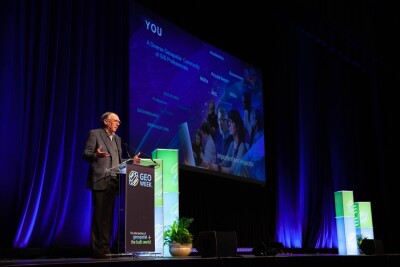The geospatial industry is not just a wide-ranging one with a number of use cases, but a lucrative one at that. While the need for geospatial information is not a new one, the industry only continues to grow as it becomes more clear to more people that this information is invaluable for a number of sectors. According to one analysis, the market is projected to grow from $67.4 billion USD in 2022 to $119.9 billion USD by 2027, a compound annual growth rate (CAGR) of 12.2 percent. Massive industries like construction, public safety, and agriculture, among others, are increasingly realizing the value this kind of information can provide their businesses.
Beyond the profitability, though, this kind of geospatial information, specifically data derived from geographic information systems (GIS) software, can be extremely valuable for the greater good. We’ve all seen how this kind of spatial data can save lives throughout the COVID-19 pandemic, where GIS information has been part of the effort to reduce spread of the virus. It’s also a key in mitigating damage as the planet experiences an uptick in extreme weather events, in large part due to climate change. The issue is that these efforts aren’t always the most profitable, and so the organizations that are working to use this technology for these purposes can’t always afford all of the software, to say nothing of the necessary training, that they need.
Esri, one of the largest geospatial companies on the planet, is working to counteract these facts and provide the organizations who most need this software with all they need. Last month, the local intelligence giant announced a new initiative, The Esri Small Nonprofit Organization Grant Initiative, in which they have pledged to provide access to GIS training and software to 150 501(c)(3) nonprofit organizations. This will help organizations doing important work not only receive the technology they need to complete their missions, but give them the proper training to ensure they are completing this work as effectively and efficiently as possible.
There are many different types of organizations who can benefit from this technology, and it’s the kind of tool that can assist with many different issues that will continue to pop up. As an example given in the company’s press release about the new initiative, they call out one nonprofit organization who, earlier this year, used geospatial technology to target likely donors and identify areas in need during the recent baby formula shortage. Esri notes that the “GIS technology available to grantees will empower nonprofits of all sizes to better communicate their cause, understand communities, act on their mission, measure impacts, as well as extend services, attract volunteers, expand donor networks, and shape public policies.”
This is the kind of technology that many of these nonprofits may not even consider as a necessity when they begin their work, though it quickly becomes clear the kind of value it can add to their processes. Having access to this kind of location data can streamline their work, allowing them to hone in on the most important areas for whatever their mission happens to be, in turn giving more time to the actual work and helping those who need it. Esri notes that nonprofits working in the areas of civic and humanitarian efforts, economic advancement, conservation, food insecurity, and civil rights can leverage GIS through this program. The deadline for applications is January 31, 2023, with awards being announced in two phases on November 17, 2022, and February 28, 2023. Recipients of the grant will be provided with:
- One GIS Professional User - ArcGIS Pro, ArcGIS Online
- Two Creator Named Users - ArcGIS Online, ArcGIS Enterprise
- Two Viewer Named Users - ArcGIS Online, ArcGIS Enterprise
- Two ArcGIS Business Analyst Web App Standard Add-Ons
Esri is a company perfectly suited for this kind of work as they are perhaps the biggest name in this space worldwide for GIS software, location intelligence, and mapping. The software from the California-based company is utilized by more than 350,000 organizations around the world, ranging from nonprofits like those discussed here to Fortune 500 companies, along with governments and universities. On this new initiative, director of government markets, Christopher Thomas, said, “The Esri Small Nonprofit Organization Grant Initiative is focused on enabling nonprofits to leverage GIS to achieve their goals while cooperating with local communities. We are proud to assist small nonprofit organizations that are new to GIS, while helping them understand the unique perspective and new insights location brings to data.”






